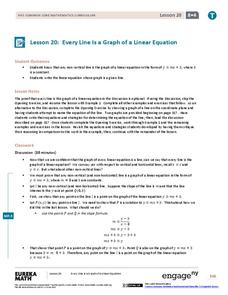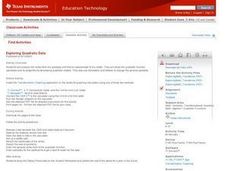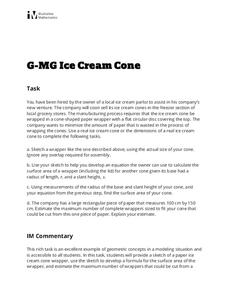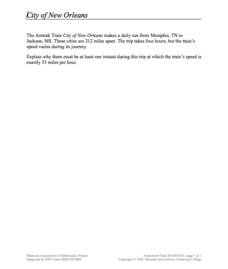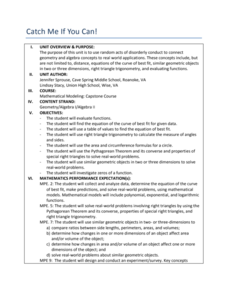Beyond Benign
Product Test
It's the moment of truth. Previous lessons in the 24-part series had scholars design and develop shampoo formulas using chemical concepts. The 18th lesson asks them to test the function of their shampoos. To do this, they calculate the...
EngageNY
Every Line is a Graph of a Linear Equation
Challenge the class to determine the equation of a line. The 21st part in a 33-part series begins with a proof that every line is a graph of a linear equation. Pupils use that information to find the slope-intercept form of the...
Illustrative Mathematics
Seven Circles III
A basic set-up leads to a surprisingly complex analysis in this variation on the question of surrounding a central circle with a ring of touching circles. Useful for putting trigonometric functions in a physical context, as well as...
Illustrative Mathematics
How Many Cells Are in the Human Body?
Investigating the large numbers of science is the task in a simple but deep activity. Given a one-sentence problem set-up and some basic assumptions, the class sets off on an open-ended investigation that really gives some...
Curated OER
Exploring Quadratic Data : Transformation Graphing
High schoolers analyze the vertex form of a parabola and find an approximate fit of a model. They explain the quadratic parabola function and its properties by developing quadratic models. They use translation and dilation to change the...
Illustrative Mathematics
Paper Clip
With minimal setup and maximum freedom, young geometers are encouraged to think outside the box on a seemingly simple application problem. Though the task seems simple, measuring a given paper clip and finding how many 10 meters can...
Illustrative Mathematics
Ice Cream Cone
Every pupil with a sweet tooth will be clamoring for this lab and analysis, particularly when they're allowed to eat the results! Volume and surface area formulas for cones are developed from models, and then extended to the printing of...
Illustrative Mathematics
Logistic Growth Model, Abstract Version
Here learners get to flex some serious algebraic muscles through an investigation of logistic growth. The properties of the constant terms in the logistic growth formula are unraveled in a short but content-dense...
Exploratorium
Oil Spot Photometer
Are these two light sources the same? Groups use a white card and a little cooking oil to create a photometer that allows for the comparison of two lights. The Inverse Square Law provides a way to calculate the actual difference in...
Concord Consortium
City of New Orleans
In the United States, most trains operate at a top speed of 100 miles per hour. Scholars use information on the distance and time of a train trip to determine if the train ever reaches a specific speed. They connect pieces of information...
Curated OER
Secant and Tangent Lines
Twelfth graders recognize the use of the slope of the secant line and connect it with the graph of the secant line, as the secant line approaches the tangent line. They also recognize the two forms of the slope formula used and practice...
Curated OER
Cost Effective Buying
Students evaluate energy-related purchases. For this consumer awareness lesson, students visit an appliance store and rank the products' cost effectiveness by using a mathematical formula.
Curated OER
Finding the Area of Triangles
Twelfth graders apply the formula for finding the area of a triangle to various problems. They work real life problems for finding the area of a bathroom and the cost of tiling it. They play a game, Triangle Bingo, where they match...
Curated OER
Jazz and Math: Improvisation Permutations
Students explore the various rhythmic combinations in jazz and blues music. They watch a video segment, apply a mathematical formula to calculate the number of possible rhythmic combinations, and perform a combination of notes and...
Curated OER
Biology: Understanding Cellular Organelles
Learners distinguish the differences between Prokaryotic and Eukaryotic cells. Using microscopes, they examine a variety of plant and animal cells. Working in groups, they draw and label plant and animal cells and show the mathematical...
Curated OER
New York State Testing Program Grade 8 Mathematics Test
In this eighth grade mathematics worksheet, 8th graders are presented with questions indicative of those on the eighth grade mathematics examination. The twelve page worksheet contains six free response questions that cover a...
Curated OER
New York State Testing Program Mathematics Test Book 3
In this eighth grade worksheet, 8th graders assess their knowledge of the major topics of algebra and geometry covered in eighth grade. The lesson contains twelve questions and a mathematics reference sheet.
Curated OER
The Power Steering Is Out?
Students use the point slope formula to calculate the slope and equation of a line. In this algebra instructional activity, students identify point on a coordinate plane using a robot. They differentiate between the different quadrants a...
Curated OER
Chapter 12 - Objective 5.1 Formula Problems
In this formula worksheet, students read short story problems and determine the correct formula. They compute compound interest, use the Richter equation to figure magnitude and find the pH of given solutions. This one-page worksheet...
Curated OER
Chapter 10 - Objective 4.1 - Distance
In this distance worksheet, students solve equations involving square roots. They use the distance formula to solve four of the ten problems. This one-page worksheet contains ten problems.
EngageNY
Measuring Variability for Symmetrical Distributions
How do we measure the deviation of data points from the mean? An enriching activity walks your class through the steps to calculate the standard deviation. Guiding questions connect the steps to the context, so the process...
EngageNY
Solving Area Problems Using Scale Drawings
Calculate the areas of scale drawings until a more efficient method emerges. Pupils find the relationship between the scale factor of a scale drawing and the scale of the areas. They determine the scale of the areas is the square of the...
Radford University
Catch Me If You Can!
Crime doesn't pay, but everyone can learn from it. Learners consider different situations involving mischief at a school, such as stink bombs and rockets, and analyze them using mathematics. They must apply trigonometry, quadratic...
Science Geek
Thermochemical Calculations
Viewers learn where the heat goes when phase changes take place with a presentation that explains the latent heat of phase changes, or, more specifically, the molar heat of fusion, solidification, vaporization, and condensation. The show...

